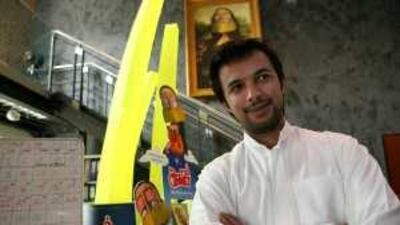Dubai // As a child, even when sick with fever, it was hard to get Mohammed Saeed Harib to sit still. He was often caught playing video games in bed instead of resting.
Now, the baby-faced 31-year-old, who revolutionised animation in the region when he cast four Emirati grandmothers as unlikely heroines, creating the beloved series Freej, is not showing any signs of slowing down as he prepares to broadcast a special one-hour episode after Ramadan. "It features camels for the first time, and is more like a movie with a deeper plot as it is one hour long compared to the usual 15 minute show," Mr Harib said.
The episode took more than a year to make. "It was a great challenge," Mr Harib said. "Actually, my work is my life, not the other way around." Surrounded by Freej merchandise and trinkets and a handful of staff at work in their cubicles, Mr Harib supervises each production piece to the tiniest detail. "I am a very demanding boss," he said with a smile. "But I am also tough on myself, and I always try to push my own limits and create perfection."
This drive, combined with the great amount of time, cost and energy that goes into bringing the whimsical characters of Um Saeed, Um Allawi, Um Saloom and Um Khammas to life, has put a strain on Mr Harib and his team at the Lammtara production company, causing the fourth season of the series to be postponed until next Ramadan. "We were just so exhausted," he said. "We have been working non-stop since 2006, and it costs so much that we had to take a break from making season four for this Ramadan."
The three seasons of Freej cost a total of Dh20 million (US$5.4m) to make, and the extravagant theatrical production of Freej Folklore earlier this year - what Mr Harib calls his "proudest achievement" - that combined 3D animation, live dance performances of dancers and acrobats twisted mixed with interactive stage art, cost more than Dh30m. "Just as the animation industry was taking off, we were hit by the economic depreciation, and sponsors and companies have cut down on spending and promotions," said Mr Harib, who declined to further discuss the productions company's finances. "It was just bad luck."
Fans still got to see some of the cranky but loveable grandmothers this Ramadan in a daily three-minute series called Freej's Book of Riddles, in which they find themselves trapped in a cursed book that can only be escaped from by solving riddles. Thanks in part to Freej, there are now other animated series on UAE channels, and they have become something of a staple of Ramadan. "I am so happy that people are now venturing into this field and that the animation world is being taken seriously and is in demand," said Mr Harib.
The list of new Emirati animated programmes includes Sha'beyat al Cartoon, produced by Haider Mohammed and in its second season, about the adventures of neighbourhood characters with different nationalities and accents. Another show, produced by Najla al Shahhi, Khoosa Boosa, portrays the daily life of an Emirati family. "There is room for more than one animation," Mr Harib said. "In many ways we complement each other and have different aims."
Whereas Sha'beyat al Cartoon is a series mainly targeting men and teenagers and is about social issues, he said, Freej is targeted at families and women and is more about culture. "When you target your show, it works," he said. "When you try to appeal to everyone, it seems to fail." Mr Harib cannot believe just how far his creation of four old women has come. "I remember just how difficult it was when I first started, as no one wanted to take the risk on what they thought was just a silly animation for children," he said.
His favourite character is the first grandmother he drew, Um Saeed, based on his own grandmother, hence the name, "mother of Saeed," where Saeed is his father. "She is the traditional grandmother, who loves coffee and is wise and embodies all the traditional values that are slowly getting lost in the shadows of a globalised commercial world," he said. Unfortunately, as his grandmother suffers from Alzheimer's disease, she has not been able to see how her grandson has paid tribute to her.
"I am glad that I was able to turn our grandmothers, who struggled a lot in the old days and are struggling today to fit into our new world, into our country's cultural icons," he said. "We finally have local heroes we can all relate to." rghazal@thenational.ae

